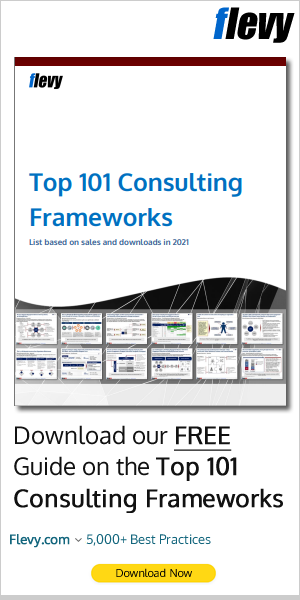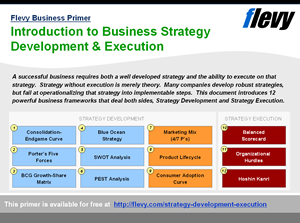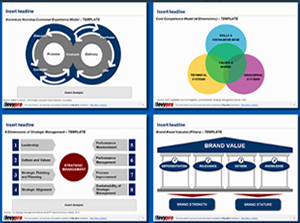Editor's Note: Take a look at our featured best practice, Digital Transformation Strategy (145-slide PowerPoint presentation). Digital Transformation is being embraced by organizations across most industries, as the role of technology shifts from being a business enabler to a business driver. This has only been accelerated by the COVID-19 global pandemic. Thus, to remain competitive and outcompete in today's fast paced, [read more]
4 Tips to Implement an Effective Digital Transformation in Business
Also, if you are interested in becoming an expert on Digital Transformation, take a look at Flevy's Digital Transformation Frameworks offering here. This is a curated collection of best practice frameworks based on the thought leadership of leading consulting firms, academics, and recognized subject matter experts. By learning and applying these concepts, you can you stay ahead of the curve. Full details here.
* * * *

If you are a small business with a limited budget, the whole idea of digital transformation may sound intimidating. However, if you consider the numerous benefits of integrating the right technologies in your business, you will find the move worth trying.
The effectiveness of integrating digital technology in your business depends on how well you implement the process. The following tips will help you get the most out of your investment, whether starting or improving the existing strategy.
1. Ensure Your Digital Expectations Aligns with Your Business Vision
The first step to creating a successful digital strategy for your business is creating a technology-inspired roadmap. Asking how digital transformation can help your business generate new opportunities is a great starting point.
In your roadmap, ensure to assess your digital capabilities, estimate the available resources, and examine possible partnerships to help you achieve your goals. More importantly, you need to understand how these implementations perform, a great way to understand this is through user feedback, which you can encourage through a google review link. In addition, assess the feasibility of the proposed initiative and its potential value. Take the following factors into consideration when creating your digital roadmap:
- Implications the move is likely to have on your business, such as disruption of the incumbent offline distribution channels
- Possible channel conflicts and potential impact on the existing distribution channel
- Practical strategies to mitigate those possible risks
When choosing a distribution channel, you have the option to embrace digital transactions fully and eliminate offline distributions or use both methods. If you choose the latter, you should develop ways to mitigate the channels.
2. Identify Key Roles Essential for Digital Transformation
Once you have a clear roadmap for your digitalization strategy, identify the key roles essential for a digital organization and develop an upskilling talent. Take the following factors into consideration to succeed at this stage:
- Evaluate your long-term and short-term talent needs and determine whether you can fill these gaps by upskilling your employees. If not, hiring new employees with the needed skills or outsourcing to digital companies offering such services.
- Develop a new structure and deployment model to accommodate the new digital team. In addition, you may consider adding a new role that oversees all the digital initiatives and reports directly to the CEO.
- Educate your employees on the digital transformations and encourage them to embrace the new changes within the organization. You can achieve this through the introduction of digital learning programs. Try to implement innovative tools, such as a quantum computer simulator or some modern AI tools. As you slowly transform to digitalization, constantly experiment on the new changes to minimize the risk of failing.
- Once your employees are familiar with the new systems, modernize the old systems and applications to decrease human error and increase productivity. This step also increases the overall productivity as employees can leverage technology to optimize their respective tasks.
3. Develop an Agile Deployment Strategy
Shifting to an agile work environment requires a collaborative approach and constant meetings between managers from all departments. Create an environment where the involved teams can test the new approaches and share ideas and information while making improvements based on aired feedback.
As you shift most of your business activities to technology and automation, be sure to address most of your employee’s concerns. Doing this prevents instances where they feel that the new technology threatens their jobs. In addition, assuring them makes them eager to learn the new technology and feel empowered to achieve their career goals.
4. Partner with Technology Professionals with Experience in Your Line of Business
Like many small businesses, you may not have the budget to hire the required IT team. In that case, consider outsourcing your IT tasks to a technology firm that understands your line of business. Such a partner understands the challenges unique to your business, providing in-budget solutions compatible with your organization.
A good tech company offers the necessary onboarding and training to your employees and helps you identify areas that can help you achieve the highest ROI. In addition, the tech company should provide you with the proper digital risk protection measures. For instance, your tech partner can:
- Educate your employees on any possible risks and how to avoid them
- Provide regular software updates and patching
- Provide cloud storage services and migrate your data to the cloud storage
- Create an effective response plan in case of an attack
- Advice on the best cybersecurity insurance for your business
Importance of Digital Transformation in Business
Once you successfully employ the above tips for your digital transformation strategy, you will soon start realizing the following benefits:
High Efficiency
One of the main reasons your business is slow in delivery is reliance on manual systems. These systems are also responsible for bottlenecks as processes have to go through the IT department for approval. The result? Increased delays, causing inefficiency. Automating tasks requiring human intervention ensures speedy completion and improved efficiency.
Improved Data Collection
If your business is involved in data collection, you can depend on automated systems to gather the correct data and incorporate it into your business intelligence. Depending on which digital technology you choose for your business, you can use the system to translate raw data from various departments and create a single view of the customer’s journey. With this information, you can make the right decisions regarding your production, finances, and possible business opportunities.
Improved Customer Experience
Analyzing the customer data you collect gives you a better understanding of your clients and their needs. You can use this information to deliver more seamless and spontaneous customer experiences.
Final Thoughts
The digital transformation journey could seem overwhelming, especially if you are a small business venturing into technology. Despite this, you cannot ignore the benefits that come with leveraging technology. To succeed in your journey, practice careful planning, partner with the right tech company, and provide essential education to your employees.
When done the right way, digital transformation can help your business improve the overall customer experience, efficiency, and decision-making by using the customer data you gather.

Want to Achieve Excellence in Digital Transformation?
Gain the knowledge and develop the expertise to become an expert in Digital Transformation. Our frameworks are based on the thought leadership of leading consulting firms, academics, and recognized subject matter experts. Click here for full details.
Digital Transformation is being embraced by organizations of all sizes across most industries. In the Digital Age today, technology creates new opportunities and fundamentally transforms businesses in all aspects—operations, business models, strategies. It not only enables the business, but also drives its growth and can be a source of Competitive Advantage.
For many industries, COVID-19 has accelerated the timeline for Digital Transformation Programs by multiple years. Digital Transformation has become a necessity. Now, to survive in the Low Touch Economy—characterized by social distancing and a minimization of in-person activities—organizations must go digital. This includes offering digital solutions for both employees (e.g. Remote Work, Virtual Teams, Enterprise Cloud, etc.) and customers (e.g. E-commerce, Social Media, Mobile Apps, etc.).
Learn about our Digital Transformation Best Practice Frameworks here.
Readers of This Article Are Interested in These Resources

|
|
181-slide PowerPoint presentation
|
|
153-slide PowerPoint presentation
| |||
About Shane Avron
Shane Avron is a freelance writer, specializing in business, general management, enterprise software, and digital technologies. In addition to Flevy, Shane's articles have appeared in Huffington Post, Forbes Magazine, among other business journals.
Top 10 Recommended Documents on Digital Transformation
» View more resources Digital Transformation here.
» View the Top 100 Best Practices on Flevy.













